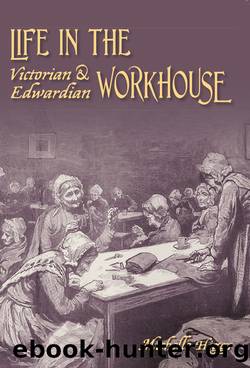Life in the Victorian and Edwardian Workhouse by Michelle Higgs

Author:Michelle Higgs [Higgs, Michelle]
Language: eng
Format: epub
ISBN: 9780750966313
Publisher: The History Press
Published: 2015-08-10T00:00:00+00:00
ADMITTANCE TO THE WORKHOUSE
Vagrants had to apply for admission to the casual ward, usually to the relieving officer for the union. From 1848, the Poor Law Board recommended that an experienced police officer should act as the assistant relieving officer. It was felt that if vagrants had to apply to the police for an admission ticket, the numbers of vagrants would decrease.20
The practice of appointing a police officer as the assistant relieving officer was abandoned after 1871. However, the assistance of the police was considered highly valuable for the staff of smaller workhouses like Lampeter. In 1896, T.J. Bircham, a Poor Law Board inspector, recommended that âthe police should be Assistant Relieving Officer for vagrants which might have a deterrent effect.â Discipline was difficult to enforce in these smaller workhouses and Mr Bircham also suggested that âit would be very desirable to construct a few labour cells, in which the task of work could be performed separately and discipline would be more easily maintained.â21
On arrival at any workhouse, vagrants were searched for money and contraband items such as matches, tobacco and dangerous items such as knives. If they had no money, they were deemed to be destitute. While there were many vagrants who were genuinely destitute, others were known to hide money and valuables in hedges or ditches close to the workhouse. At Stafford, the vagrants had âalmost pulled down a hedge near the workhouse by hiding money in it.â22
Vagrants were only admitted to workhouses after a specific hour, usually 5 p.m. However, late admissions often caused problems for both the staff and inmates of the workhouse. In 1866, the master of Shifnal Union Workhouse complained that âTramps sometimes obtain orders from the relieving officer between six and seven oâclock, get them countersigned by the police-constable and then stop at public-houses in the town till between eleven and twelve, when they come to the workhouse and disturb the inmates by violently shouting and kicking at the outer doors.â23 In 1874, after enquiring about the times of admittance in neighbouring unions, the guardians of the Dudley Union ordered that âno Tramp or Vagrant shall be admitted to the union workhouse after 10 oâclock at night.â24 It is not known if this rule was strictly enforced.
Late admissions were still problematic at the beginning of the twentieth century. At Lampeter Union Workhouse in 1903, the master complained that the:
Download
This site does not store any files on its server. We only index and link to content provided by other sites. Please contact the content providers to delete copyright contents if any and email us, we'll remove relevant links or contents immediately.
Guns, Germs and Steel by Diamond Jared(2365)
Collapse: How Societies Choose to Fail or Succeed by Jared Diamond(1514)
The Emperor of All Maladies by Siddhartha Mukherjee(1438)
Transcendence by Gaia Vince(1139)
148424513X by Unknown(1077)
Seven Skeletons by Lydia Pyne(1067)
Civilization One by Christopher Knight(1003)
Sapiens - A brief history of humankind (Marathi) by Yuval Noah Harari(992)
The Rational Optimist: How Prosperity Evolves by Matt Ridley(965)
THE MASTER AND HIS EMISSARY by Iain McGilchrist(942)
Guns, Germs, and Steel: The Fates of Human Societies by Jared M. Diamond(927)
At Home by Bill Bryson(909)
Underworld The Mysterious Origins of Civilization by Graham Hancock(899)
How the Irish Saved Civilization by Thomas Cahill(895)
Marco Polo by Laurence Bergreen(893)
Atrocitology by Matthew White(880)
Ancient Iraq by Georges Roux(863)
The World Until Yesterday: What Can We Learn From Traditional Societies? by Jared Diamond(855)
Guns, Germs and Steel: The Fates of Human Societies by Jared Diamond(842)
